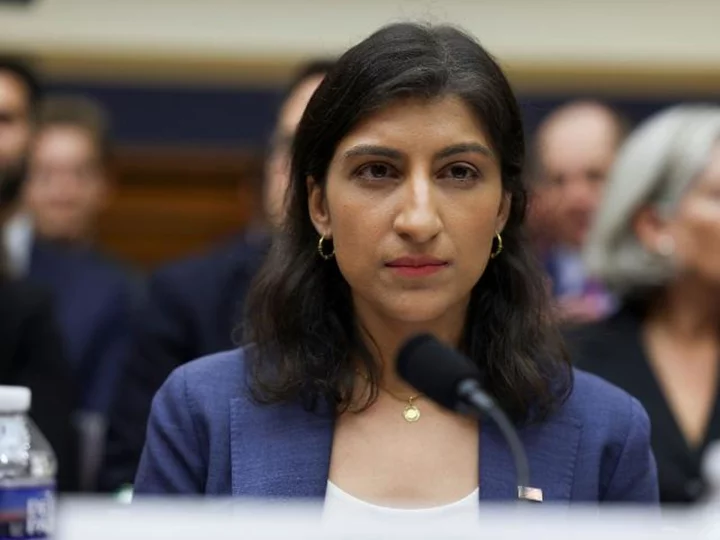Just seven stocks -- Apple, Microsoft, Alphabet, Amazon, Nvidia, Tesla and Meta Platforms -- make up close to $11 trillion in market value and contributed about 75% of returns of the S&P 500 in the first half of 2023, according to a recent Bank of America report.
Big Tech is soaring to new heights -- largely by quickly gobbling up any potential competition.
That worries the Federal Trade Commission and the Biden administration. The so-called "magnificent seven," they fear, could become monopolies that buy and squash any new innovation so they can remain on top.
The question is whether the FTC and White House have the power to stop that.
What's happening: Two years ago, Lina Khan, 34, became the youngest and perhaps most progressive leader of the FTC's 100-plus year history.
Khan's tenure was heralded as the start of a new era of antitrust governance in the US that would challenge decades of loose policy towards mergers and acquisitions, which allowed tech titans to swallow up their competition and emerge as companies with trillion-plus dollar market caps.
So far, those challenges haven't made a huge impact.
Apple is now worth $3 trillion, the only company ever to reach that milestone. Khan, meanwhile, was unable to successfully block Microsoft from closing its $69 billion purchase of videogame publisher Activision Blizzard last week. The FTC is appealing, but lost a similar case earlier this year when it was unable to prevent Meta Platforms from purchasing virtual reality startup Within Unlimited.
Earlier this month, Khan sat before Congress for more than three hours while facing a barrage of criticism from Republican policymakers who accused her of "harassing" businesses during a House Judiciary Committee hearing.
"You are now zero for four in merger trials," Representative Kevin Kiley, a Republican from California, said to her. "Why are you losing so much?"
But Khan appears undeterred, and late last week, the FTC and President Joe Biden released a set of long-anticipated draft updates to the nation's merger guidelines, introducing potentially comprehensive changes to the way the US government reviews mergers and acquisitions for the first time in more than a decade.
The proposed changes could lead to major shifts in how the US government identifies — and tries to block or alter — deals it believes are anticompetitive, reports my colleague Brian Fung.
Some members of the business community aren't happy about that.
But on Monday, Khan defended her record and actions at The Economic Club of New York.
"In federal court, we have lost two merger cases. We have brought somewhere between 13 and 20, depending on how you count," Khan said. "In the scheme of our merger enforcement program, losing two is OK."
The FTC, she said, doesn't have any specificity about how big or small a business should be. "Congress, when passing the antitrust statutes, was setting out a policy preference, in many cases, for competition over monopoly," Khan said. "That said, the statutes don't prohibit being a monopoly. They only prohibit becoming a monopoly through illegal tactics. And so that's the sort of thing that we look at."
What's next: Khan, who first garnered attention when she wrote a 98-page article about Amazon's anticompetitive behavior for the Yale Law Journal, is undeterred. She's preparing to take on Amazon headfirst in the coming months with a big antitrust suit.
Khan's FTC has already put forward three cases against Amazon, but according to a Bloomberg report, they are getting ready to take them on once again. The suit, reported Bloomberg, will focus on Amazon's core marketplace business -- alleging that Amazon uses its power to reward merchants that use its logistics services and punishes merchants that don't.
Tech earnings also begin this week. Alphabet and Microsoft report on Tuesday afternoon followed by Meta on Wednesday.
The rise of gig workers is changing the face of the US economy
From CNN's Samantha Delouya
Lazarus Limo usually starts his day at 10 a.m. ET, driving passengers and delivering food for Uber around Chapel Hill, North Carolina.
"I tend to set a minimum target of how much I should get by the end of the day. As soon as I get my target, that's it; I'm done for the day," he said. His goal is usually to make between $200 and $300 and, depending on the day, achieving it may take him between 8 and 10 hours, he told CNN.
But that's just his weekday job.
On weekends, Limo, who is 28 years old, works as a "Dasher," delivering food orders for DoorDash.
He is one of millions of people in the United States who participate in the so-called "gig economy," a term that has grown in popularity over the last decade to describe the rise in freelancing work through apps like Uber, Lyft, Doordash and Instacart.
Government data on this group of workers is elusive. The last time the Bureau of Labor Statistics officially tracked workers with alternate job arrangements was 2017. But workplace experts say the number of gig workers is growing, and and their impact is being felt throughout the economy. It could even be distorting government economic data, they say. For example, easy-to-access work through mobile phones may be keeping the national unemployment rate lower than it would be without the rise of these workers. It may also be a factor helping more people avoid bankruptcies, providing a fallback option for those who have been laid off from work in recent years, they say.
"People who have access to the gig economy borrow less money than people who don't. You can think of it as an alternative to debt for some people — as a way to get through volatile times," said Louis Hyman, a professor of labor and business at Cornell University. "Society needs to account for these different kinds of experiences."
Read more here.
'Barbenheimer' box office debut sparks hopes that cinema is back
Have you tried to get tickets to go see the Barbie movie? I have and it's nearly impossible -- there are only front row tickets available for more than a week out.
That's something I haven't seen in a while, since well before the pandemic began. Insiders are hoping that this isn't a fluke and that after years of declining box office profits, cinema is staging a comeback.
Summer blockbusters "Barbie" and "Oppenheimer" have given the troubled film industry a big shot in the arm, reports my colleague Anna Cooban.
The films raked in a combined $511 million in box office sales over their opening weekend, according to Boxoffice.com, which cited data from Warner Bros., the producers of "Barbie," and Universal Studios, which is behind "Oppenheimer."
It was "Barbie" that came out on top, earning $337 million globally, compared with "Oppenheimer's" $174 million. That gave the pink-drenched film the largest opening weekend of 2023 so far and the biggest-ever debut for a female director. (Warner Bros., is owned by CNN's parent company Warner Bros. Discovery.)
The unlikely pairing seems only to have fueled interest in both. AMC, the world's largest movie theater chain, said last week that 60,000 people had bought tickets see both films on the same day.
"The Barbenheimer phenomenon was the catalyst to something we hadn't seen for years in this industry: rather than driving the cultural conversation around seeing a movie, it became a global viral campaign around going to the movies," Daniel Loria, editorial director at Boxoffice.com, told CNN.
But whether the success of both films will translate into a sustained revival of the movie industry remains to be seen. Big budget films like DC's "The Flash" and Disney's "Indiana Jones and the Dial of Destiny" have underperformed this summer, and an ongoing strike by Hollywood actors and writers over pay and working conditions has temporarily stopped production on most films.









